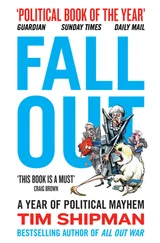Tim Shipman - All Out War - The Full Story of How Brexit Sank Britain’s Political Class
Здесь есть возможность читать онлайн «Tim Shipman - All Out War - The Full Story of How Brexit Sank Britain’s Political Class» — ознакомительный отрывок электронной книги совершенно бесплатно, а после прочтения отрывка купить полную версию. В некоторых случаях можно слушать аудио, скачать через торрент в формате fb2 и присутствует краткое содержание. Жанр: unrecognised, на английском языке. Описание произведения, (предисловие) а так же отзывы посетителей доступны на портале библиотеки ЛибКат.
- Название:All Out War: The Full Story of How Brexit Sank Britain’s Political Class
- Автор:
- Жанр:
- Год:неизвестен
- ISBN:нет данных
- Рейтинг книги:3 / 5. Голосов: 1
-
Избранное:Добавить в избранное
- Отзывы:
-
Ваша оценка:
- 60
- 1
- 2
- 3
- 4
- 5
All Out War: The Full Story of How Brexit Sank Britain’s Political Class: краткое содержание, описание и аннотация
Предлагаем к чтению аннотацию, описание, краткое содержание или предисловие (зависит от того, что написал сам автор книги «All Out War: The Full Story of How Brexit Sank Britain’s Political Class»). Если вы не нашли необходимую информацию о книге — напишите в комментариях, мы постараемся отыскать её.
All Out War: The Full Story of How Brexit Sank Britain’s Political Class — читать онлайн ознакомительный отрывок
Ниже представлен текст книги, разбитый по страницам. Система сохранения места последней прочитанной страницы, позволяет с удобством читать онлайн бесплатно книгу «All Out War: The Full Story of How Brexit Sank Britain’s Political Class», без необходимости каждый раз заново искать на чём Вы остановились. Поставьте закладку, и сможете в любой момент перейти на страницу, на которой закончили чтение.
Интервал:
Закладка:
Andrew Cooper, the pollster who was a key figure in driving Tory modernisation, said, ‘Ukip, who nearly won the European elections in 2009, were very likely to win the European elections in 2014. We’d have been in meltdown and ended up being forced into a referendum commitment.’ He told Cameron, ‘Since it is a question of when, not if, let’s do it now, let’s do it calmly and set out a proper argument.’ The prime minister saw the logic in this. As another member of his inner circle put it, ‘There is an element where David thinks when the big judgement call needs to be made, “Put your balls on the line, let’s do it.”’
Once again, George Osborne was the most outspoken opponent of the idea. His father-in-law David Howell – a cabinet minister under Margaret Thatcher – told a Conservative activist that the chancellor ‘implored’ Cameron not to hold a referendum. Once again his objections were dismissed. In secret, Ed Llewellyn, the chief of staff in Downing Street, began work on the most important speech of Cameron’s career.
By now some of Cameron’s closest allies, including Steve Hilton and Oliver Letwin, were flirting with leaving the EU altogether. Most significantly, at the party conference in October, education secretary Michael Gove told journalists from the Mail on Sunday that on the current terms of membership he would vote to leave. Despite his resolute Euroscepticism, Gove, like Osborne, was a firm opponent of a referendum. He had two concerns. Even at this early stage he was worried that he ‘would have to stand on a different side to the prime minister’, which would be ‘painful’. He also felt that Cameron had not worked out what his strategy was, and what Britain wanted out of Europe. Gove saw a pattern where the prime minister sought confrontation with the sceptics, told them ‘You’re all lunatics,’ refused their demands, and then ‘caved in’. A source close to Gove said, ‘Throughout the time, Michael thought this whole thing was a recipe for disaster. What we’re not doing is thinking through what Britain will be outside the EU, we’re adopting a bunch of tactical strategies to stave off either Ukip’s growth or our backbench problems.’
Gove went so far as to put these concerns in writing, emailing Cameron before the speech to tell him, ‘You don’t need to do this, you don’t need to offer a referendum.’
‘Don’t worry, I know what I’m doing,’ came the breezy reply.
Angela Merkel’s views were assiduously sought before the big speech. A Downing Street aide recalled, ‘We were paranoid about this thing going off completely half-cocked, with Merkel and [French President François] Hollande going out the next day to say, “This is a pile of absolute shit, Britain is going to get nothing from this.” A lot of work was going into at least making sure they didn’t blow the idea of negotiations out of the water.’
The prime minister gave Merkel dinner in Downing Street on 7 November, at which he explained, ‘I’ve supported our membership of the EU all my political life, but I am worried that if I don’t get the reform objectives I’m setting out, I won’t be able to keep Britain in.’12 Merkel called Britain Europe’s ‘problem child’,13 and urged him to ‘couch the speech in an argument about Europe having to change’ – in other words, a better deal for everyone. A Number 10 official recalled, ‘The strategy was always: schmooze the pants off Merkel, get that locked down and then everyone else will fall in behind. It was damage limitation with the French. You got the sense that she was never wholeheartedly embracing it. The best you could hope for was that she could accept the political argument for him doing it and not stand in the way.’
After several delays, the speech finally went ahead on 23 January. Cameron actually struck a notably pro-European tone, praising the EU for helping to raise Europe from the grip of ‘war and tyranny’. But it was an argument couched in Macmillanite practicalities: ‘For us, the European Union is a means to an end – prosperity, stability, the anchor of freedom and democracy both within Europe and beyond her shores – not an end in itself.’ He warned, ‘democratic consent for the EU in Britain is now wafer-thin’.
Cameron spelt out his demands: more competitiveness and the completion of the single market, an end to ‘one size fits all’ integration. He said this would mean Britain abandoning the goal of ‘ever closer union’ written into the Treaty of Rome. He added, ‘Power must be able to flow back to member states, not just away from them,’ and called for ‘a bigger and more significant role for national parliaments’. Finally, he demanded new rules that ‘work fairly for those inside [the euro] and out’. Heeding Merkel’s advice on how to pitch his call for reform, he said, ‘I am not a British isolationist. I don’t just want a better deal for Britain, I want a better deal for Europe too.’
Largely forgotten afterwards, Cameron predicted that ‘in the next few years the EU will need to agree on Treaty change’, gifting him an occasion when Britain could get its new grand bargain. But when Germany cooled to that idea, his leverage was removed. Also forgotten, given how central it became to his deal, the speech included not one reference to immigration or migration.
Coming to the crux of the matter, he declared, ‘I am in favour of a referendum. I believe in confronting this issue – shaping it, leading the debate, not simply hoping a difficult situation will go away.’ Those looking back at the speech after the referendum would have been amused to find this entreaty: ‘It will be a decision we will have to take with cool heads. Proponents of both sides of the argument will need to avoid exaggerating their claims.’ Nevertheless, Cameron vowed that if he got the deal he wanted, ‘I will campaign for it with all my heart and soul’.
The speech was met with a rapturous reception at home, where the sceptics seized on one key phrase: ‘We need fundamental, far-reaching change.’ When he entered the Commons chamber for PMQs later that morning he was met with a barrage of cheers. The Eurosceptics had got what they wanted.
Speaking in 2016, a Cameron aide said his main error was to lay out ‘red lines’, but not to use the speech to level with voters and his MPs that it was a starting point for discussion with Brussels, rather than an inviolable text. ‘The problem was that we didn’t make arguments like “We’re going to have to compromise,”’ a senior figure in Number 10 said. ‘It was a huge error.’ The Palaeosceptics who rejoiced at the speech were like Biblical or Koranic literalists – they planned to hold Cameron to every word of it. Bernard Jenkin seized on the comment that national parliaments were ‘the true source of real democratic legitimacy and accountability in the EU’, and warned Cameron, ‘You’ve really got to deliver on this otherwise the Conservative Party will tear itself to pieces.’ Cameron’s response was to wave his hand dismissively and say, ‘When the referendum comes the party will split, and that’ll just have to be that.’ To Jenkin the prime minister had the air of a man who had made the promise of a referendum that he never thought he would actually have to deliver, since by now few thought the Conservatives could win an overall majority at the 2015 general election and govern without the Lib Dems, who may have sought to veto any referendum. Iain Duncan Smith, the work and pensions secretary, said, ‘I have no doubt that the thinking in Downing Street … was that the outcome was likely to be a coalition government and … that this referendum would be traded away.’14
For once, though, Cameron had gone far enough to satisfy the bulk of backbench opinion. He had adopted a position sufficiently robust to prevent the party disintegrating before the general election. For almost two years the Tory troublemakers, to adopt the classic dictum, would direct most of their piss outside the tent, and when they seemed in danger of misplacing the urinal – introducing a Private Member’s Bill to hold a referendum – Cameron ended up adopting the Bill. But he was soon to discover the accuracy of one minister’s theory of parliamentary urinators: ‘Westminster is not divided into people inside the tent pissing out and people outside the tent pissing in, it is divided into people who piss and people who don’t. It doesn’t matter where the pissers stand, the piss always gets into the tent eventually.’ As a description of what Cameron’s Bloomberg speech set in train, it was hard to top.
Читать дальшеИнтервал:
Закладка:
Похожие книги на «All Out War: The Full Story of How Brexit Sank Britain’s Political Class»
Представляем Вашему вниманию похожие книги на «All Out War: The Full Story of How Brexit Sank Britain’s Political Class» списком для выбора. Мы отобрали схожую по названию и смыслу литературу в надежде предоставить читателям больше вариантов отыскать новые, интересные, ещё непрочитанные произведения.
Обсуждение, отзывы о книге «All Out War: The Full Story of How Brexit Sank Britain’s Political Class» и просто собственные мнения читателей. Оставьте ваши комментарии, напишите, что Вы думаете о произведении, его смысле или главных героях. Укажите что конкретно понравилось, а что нет, и почему Вы так считаете.












